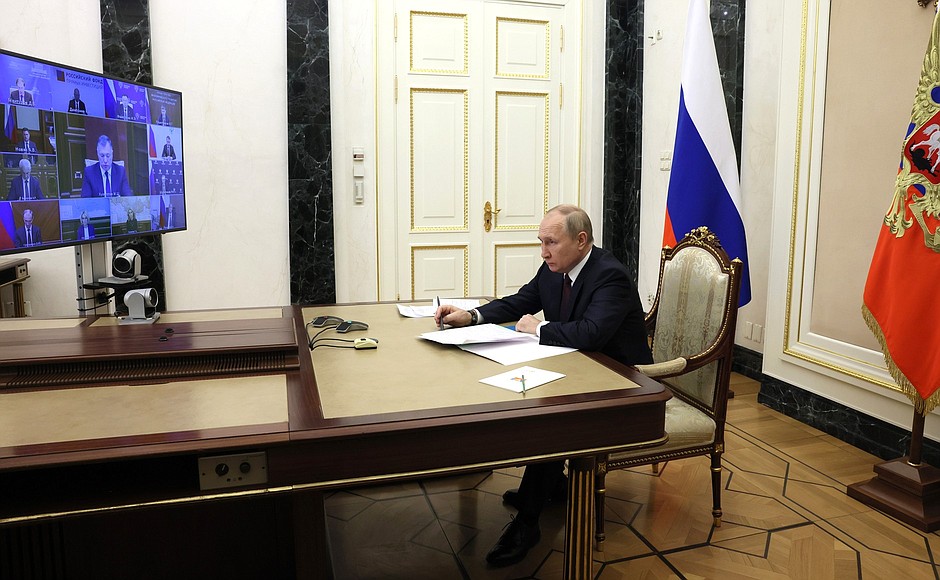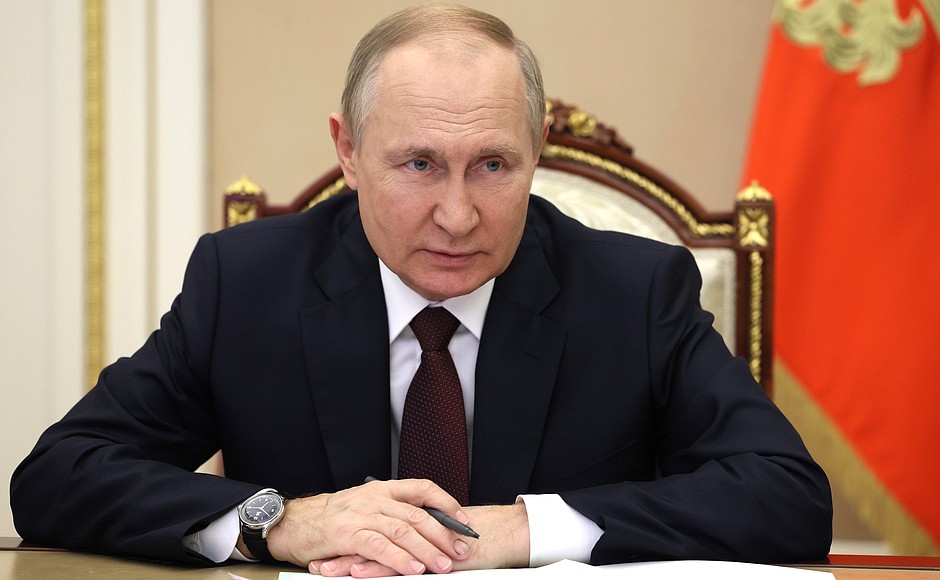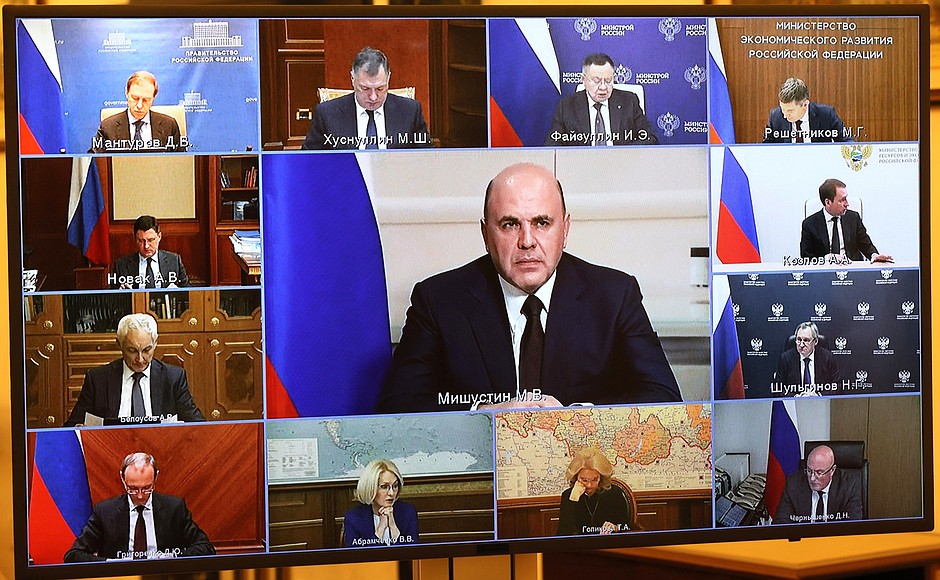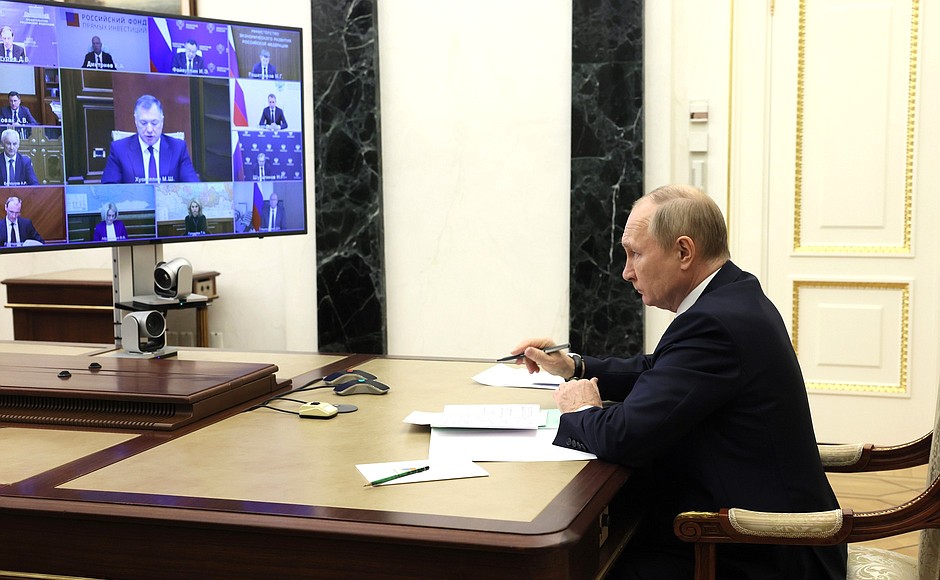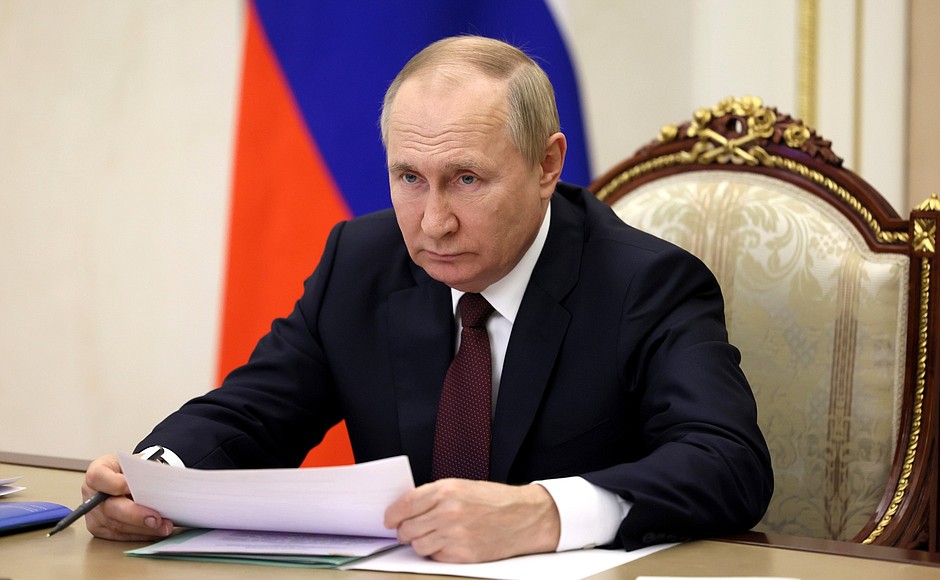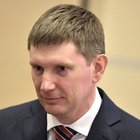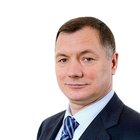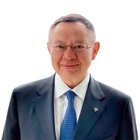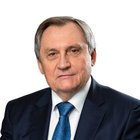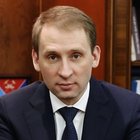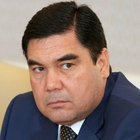The main topic of the meeting was investment support tools in the current conditions. Minister of Economic Development Maxim Reshetnikov presented a report.
The meeting participants discussed a number of current issues. Deputy Prime Minister Marat Khusnullin reported on the progress in repairing the Crimean Bridge and the final deadlines. Minister of Construction, Housing and Utilities Irek Fayzullin and Minister of Energy Nikolai Shulginov informed the President about the ongoing heating season and the operation of energy supply systems, including in the four new regions. Minister of Natural Resources and Environment Alexander Kozlov spoke about the North Pole 41 expedition on a unique ice-resistant platform built at the Admiralty Shipyards.
President of Russia Vladimir Putin: Good afternoon, colleagues,
Before we start, I would like to convey greetings from Gurbanguly Berdimuhamedov, who just left. I awarded to him the state Order for Service to the Fatherland, IV degree, in recognition of his significant contribution to developing relations between our countries. He is here to meet with our parliament, but, indeed, he has done much to promote ties between our countries.
Today's meeting will focus on investment support tools in the current circumstances. Maintaining the necessary level of investment is among the key goals at any time and is particularly relevant today. We all understand that there is no need to go into detail. We will discuss this matter in greater detail after Maxim Reshetnikov is done with his report.
As agreed, we will start with several topical issues, and the first question is for Marat Khusnullin: what is the status of repairs on the Crimean Bridge?
Deputy Prime Minister Marat Khusnullin: Mr President,
The Government Commission, established on your instructions, has launched works to repair and reconstruct the Crimean Bridge and to ensure transport connection with the Crimean Peninsula. As of today, works to reinforce the span structures and repair the pillars of the left, undestroyed side of the bridge have been completed.
A detailed study has shown that four spans on that side were damaged and deformed, and we will have to replace them with new ones. Still, at present, cars and other passenger vehicles, buses and if necessary, some freight vehicles, are moving in both directions on this side of the bridge as usual, with all vehicles being subject to inspection and constant monitoring being conducted by specialised agencies round-the-clock.
(Further, Mr Khusnullin described the technological processes for restoring the bridge. Three plants in Tyumen, Voronezh and Kurgan fabricated and delivered 1,218 tonnes of metal structures in record time for the right, destroyed, part of the bridge. Mr Khusnullin thanked the management of the companies and regions for the quick fabrication and shipping of these structural components. The new span structures will be installed on November 5–10. The works are being carried out round the clock by 500 people with the use of 50 pieces of equipment and two floating cranes. The work schedule is being observed despite the storms in the area.)
The Government has allocated the funds required for restoration of the motor bridge and a state contract has been signed.
This is how we plan to launch traffic on both lanes on the right side of the bridge: December 5 – on one lane; December 20 – in full, on the other lane. Then we will start dismantling the spans of the left, less damaged side of the bridge, and we plan to complete this work by March 30. After that we will still have to do some things that will not affect traffic – technical details, cleaning, etc., and we will finish these by July 1.
To provide Crimea with goods and prevent shortages, we are focusing on reducing traffic congestion during repair and reconstruction work.
The ferry crossing, with five vehicle ferries and two railway ferries, has been established to provide for cargo traffic across the Kerch Strait. There are also two vessels for transporting people when necessary.
(The Deputy Prime Minister also talked about organising motor traffic in the adjacent areas of the Krasnodar Territory, the Rostov Region and Crimea. He said that starting October 10, an alternative vehicle route, through the new constituent entities of the Russian Federation, had been opened).
As for the railway bridge, we have organised reversible traffic on the first track. All trains are on schedule; there are no delays. Works specification for the reconstruction of the second track has been approved. Two support structures will have to be replaced.
I would like to note that Roszheldor [the Federal Agency for Rail Transport] and the contractor have submitted a schedule for opening the second track by September 15, 2023. But, Mr President, we are asking for more time for the commission to have another look at it. We believe this work can be done faster. We will spend just a few days on this. I may go look at it again. We will make a final decision to move faster.
The Government has allocated the funding for the reconstruction and repairs, and a single contractor has been chosen for making the railway section design.
Mr President, everything is proceeding properly. We report on the situation in the morning and again in the evening. So far, we're on schedule, as I said. We get the commission together quickly. All measures are being taken. We hope that supplying the Crimean Peninsula with everything it needs will be back to normal soon.
Thank you. This concludes my report.
Vladimir Putin: Ok.
Many thanks to all those who are taking part in these works. I join in your words of gratitude to those who manufacture the necessary structures so quickly. I hope that all plans will be implemented as soon as possible. Thank you.
<…>
Vladimir Putin: Thank you very much.
I am pleased that we maintain an ongoing dialogue on key economic issues. The dialogue is lively and engaged, and I often hear different, albeit not diametrically opposed, approaches. But this is exactly the point of this creative approach that makes it possible for us to stay the course that ensures the steady operation of our public finances and the economy in general. I hope we will continue working like this as we go forward.
Here is what I would like to say in closing.
We always say that ensuring investment is one of the key elements of development. I do not remember us ever saying that we have done a brilliant job in this department. We have always worked to improve the mechanisms for attracting investment, above all, private investment.
Of course, in the current circumstances, doing so has become harder by orders of magnitude. But there are certain niches that come with these challenges. We should use them, no questions asked. This is about mobilising intellectual and financial resources, our capabilities, the capabilities of our companies, and these capabilities are not waning. The challenges stem from the need to do our own research in critical areas of development. Public investment in these priorities will certainly yield results.
I would like to thank everyone for your painstaking efforts to draft this proposal, this draft list of instructions. Clearly – and I agree with our colleagues – some items need to be fine-tuned, but please do not delay this. I understand that some of these items are important, and you can dance around and fine tune them indefinitely, but I want you to finish this process as soon as possible.
Mr Mishustin, how long, do you think, will it take you to finalise these items?
Prime Minister Mikhail Mishustin: Mr President, we would ask for a week, since there are some technicalities to address. But no more than that.
Vladimir Putin: Excellent. I fully agree.
The borrowing mechanism and debt obligations are fundamental matters, and I think we will deal with them separately. We must coordinate everything with the Central Bank, and the Finance Ministry must fully engage in this. But in general, I think that the job is well done, done at a good level, and the approaches are quite bold. No doubt, this will yield good results.
Thank you very much. All the best.
